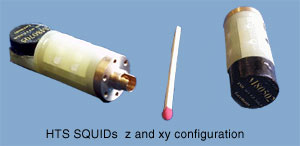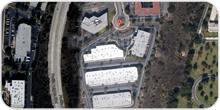Tristan offers several configurations of low-noise SQUID sensors (pdf); these sensors serve as the heart of our iMAG® systems. Address your magnetic sensing applications with the latest technology in both high-temperature and low-temperature superconductivity.
 The low-temperature (LTS) SQUIDs run at liquid helium temperatures and are fabricated using all thin-film trilayer technology, combining durability with high sensitivity. The niobium-shielded package comes with screw terminals ready to accept your custom input circuit. Tristan can also provide thin-film integrated LTS SQUID magnetometers with state-of-the-art performance.
The low-temperature (LTS) SQUIDs run at liquid helium temperatures and are fabricated using all thin-film trilayer technology, combining durability with high sensitivity. The niobium-shielded package comes with screw terminals ready to accept your custom input circuit. Tristan can also provide thin-film integrated LTS SQUID magnetometers with state-of-the-art performance.
The high-temperature (HTS) SQUIDs run at liquid nitrogen temperatures, 77 K. HTS iMAG® SQUIDs feature pick-up coils patterned on the chip, with a tough passivation layer for protection from moisture and oxygen. We can guarantee magnetometer performance better than 100 fT/√Hz. For customers who need even lower noise levels, we can provide sensors with world-record noise performance; contact us for the latest specifications and pricing. All HTS iMAG® sensors use a common connector for attaching to the SP Cryogenic Cable; sensors may be easily interchanged to provide alternative pick up coils and different sensitivity levels.
- Model LSQ/20 LTS dc SQUID sensor
- Model LSQ/20M LTS dc SQUID sensor (for MFP Probe)
- Model HTM-3 HTS dc SQUID Magnetometer Sensor (< 500 fT/√Hz)
- Model HTM-10 HTS dc SQUID Magnetometer Sensor ( < 100 fT/√Hz)
- Model HTM-0 MiniMAG™ HTS dc SQUID Microscope Sensor ( > 100 µT ambient field operation, 50 micron thick window)
Lower noise sensors, high field operation and sensors mounted at 90° orientations (i.e., Bx, By) are available as options.
Low-Temperature (LTS) SQUIDs
The low-temperature (LTS) SQUIDs run at liquid helium temperatures and are fabricated using a niobium / aluminum all thin-film trilayer technology that combines durability with high sensitivity. They feature symmetric integral signal and modulation coils that eliminate output variations with varying input loads. The niobium-shielded package comes with screw terminals ready to accept your custom input circuit. Tristan can also provide thin-film integrated LTS SQUID magnetometers with state-of-the-art performance. The Tristan Model LSQ/20 can be used with the Model SP Cryogenic Cable for ultrasensitive measurements of both current (< 0.7 pA/√Hz) and magnetic field (< 1 fT/√Hz). In conjunction with the Model MFP Cryogenic Probe, it can measure a much wider range of electromagnetic properties — download Tristan’s Cryogenic Probe data sheet (1 Meg pdf) for more information.
Input coil inductance: 1.8 µH nominal
Noise level: < 5 x 10-31 J/Hz
< 5 x 10-6 Φ0/√Hz
1/ƒ knee: below 0.5 Hz
Input coil sensitivity: 0.2 µA/Φ0
Temperature range: 0 – 7 K
High-Temperature (HTS) SQUIDs
The high-temperature (HTS) SQUIDs run at liquid nitrogen temperatures, 77 K, and are offered in a magnetometer configuration. Tristan’s HTS iMAG® SQUIDs feature pick-up coils patterned on the chip and a tough passivation layer for protection from moisture and oxygen. We can guarantee magnetometer performance better than 100 fT/√Hz. For customers who need even lower noise levels and performance in magnetic fields, we can provide sensors with world-record noise performance; contact us for the latest specifications and pricing. All HTS iMAG® sensors use a common connector for attaching to the Model SP Cryogenic Cable; they may be easily interchanged to allow alternative pick-up coils and different sensitivity levels.
 |
HTM-10 Sensitivity: < 100 fT/√Hz 1/ƒ knee: ~ 10 Hz Pick-up Coil dimensions: 10 mm x 8 mm Operating Temperature: 77 K Operating field: 0 – > 0.1 mT
|


